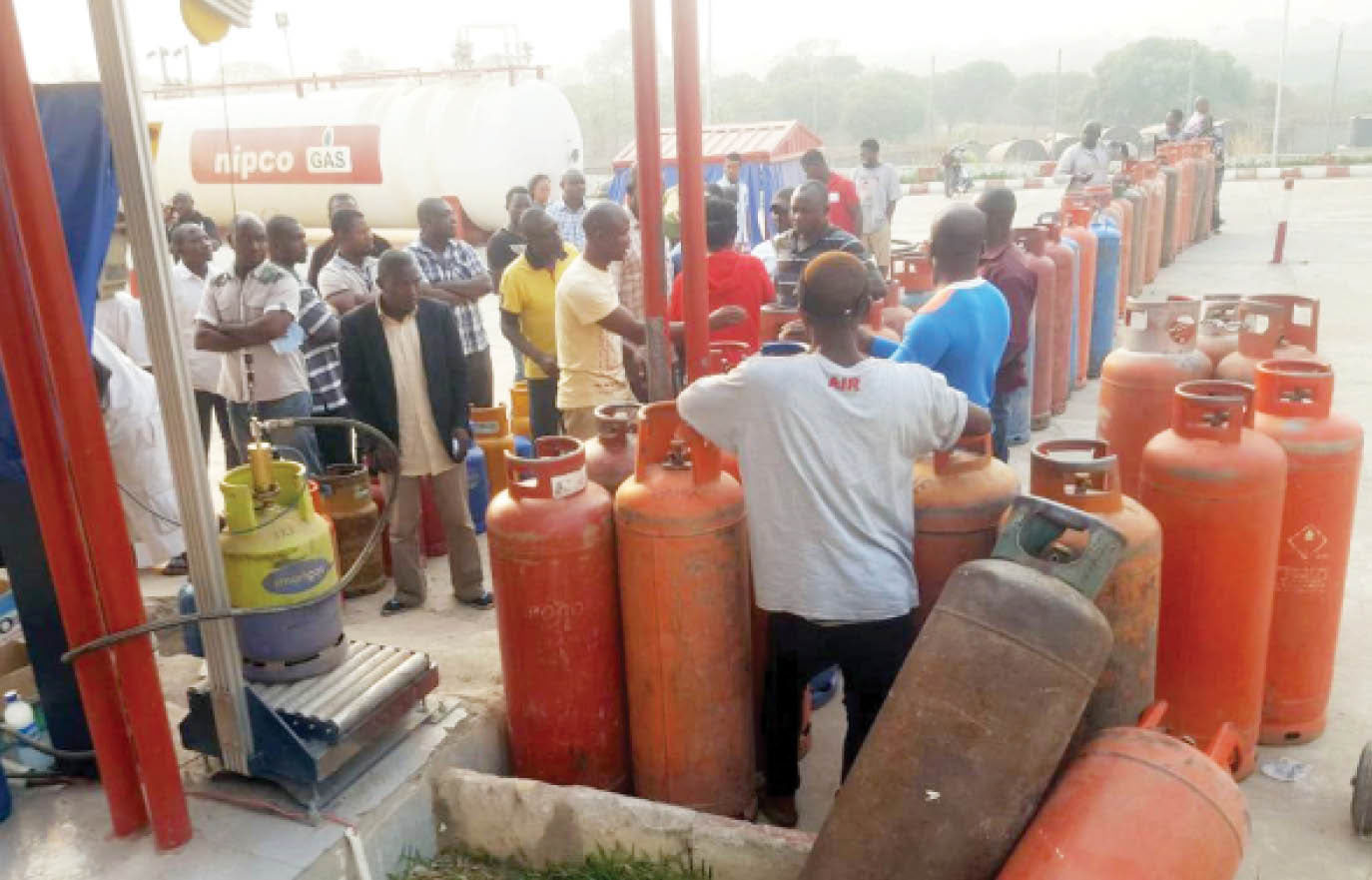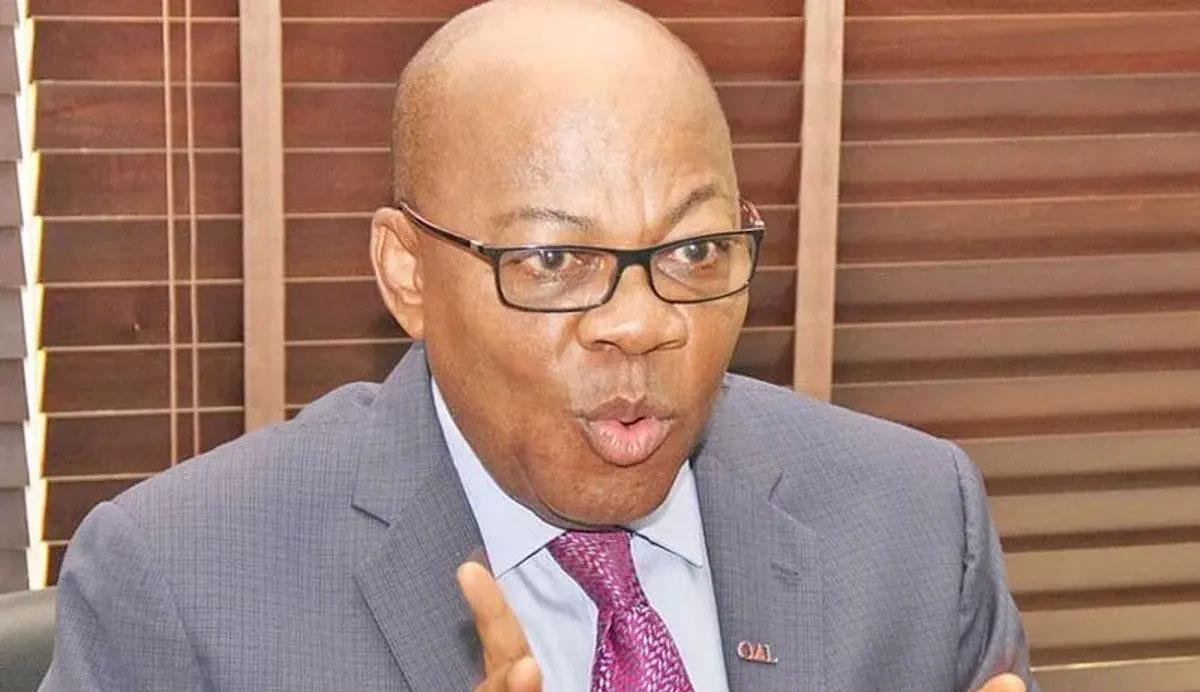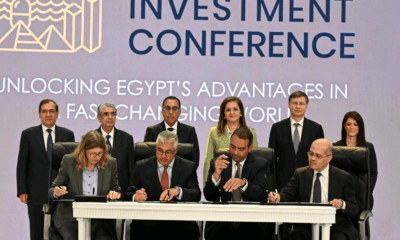News
Cooking gas price crashes after ban on exportation

Cooking gas price crashes after ban on exportation
The Federal Government’s ban on the export of Liquefied Petroleum Gas, popularly called cooking gas, has led to a crash in the cost of the commodity from about N1,500 per kilogram to around N900/kg, LPG dealers stated on Wednesday.
Cooking gas dealers under the aegis of the Nigerian Association of Liquefied Petroleum Gas Marketers disclosed this during a courtesy visit on the Minister of State for Petroleum Resources (Gas), Ekperikpe Ekpo, in Abuja.
On February 22, 2024, The PUNCH reported that the Federal Government banned the exportation of LPG in a bid to increase its volume domestically to warrant a crash in price.
It stated at the time that LPG producers in Nigeria and key stakeholders in the industry had been told to stop exporting the commodity out of Nigeria, following the jump in the cost of cooking gas.
Speaking at the meeting with the gas minister on Wednesday in Abuja, the National President, NALPGAM, Oladapo Olatunbosun, commended Ekpo for the courage in ordering the domestication of all LPG produced within the country, stressing that the policy resulted in the reduction and stabilisation of the product’s price in the domestic market.
Olatunbosun, in a statement issued by the minister’s media aide, Louis Ibah, recalled that during a stakeholders consultative forum in Abuja in February this year, the association had drawn the minister’s attention to the fact that some international oil companies operating in Nigeria had been exporting huge volumes of gas.
He had pointed out that if these volumes were to be available for the domestic market, there would be no need to import LPG at exorbitant rates as the product would be available and there would be price stability in the local market.
READ ALSO:
- Customs intercept pangolin scales worth N3.9bn in Kebbi
- Man jailed 14 years for attempted sexual assault on minor
- Banditry: Police arrest Zamfara lawmaker, district head, ex-LG chairman
The NALPGAM president thanked the Federal Government for heeding to their plea, as the government’s intervention made the price of LPG that was sold fo N20m per 20 metric tonnes reduced to N15m.
And at the retail end, there is a corresponding decrease from N1,400 – N1,500 per kilogram to between N900 – N1,000 per kilogram, according to the gas marketer, as contained in the statement.
Olatunbosun was quoted as saying, “We appreciate the fact that at the parley with us you (Ekpo) promised that the issue of exporting LPG in the face of inadequate supply and soar in prices will be addressed, and indeed you have taken steps to walk the talk.
“Today we say thank you because the ban on LPG export has made a lot of changes in the market and consumers can testify to this.
“People who abandoned their gas cylinders due to price hike are coming back and we are confident that by the time the naira gains more weight, consumers will enjoy better price of LPG.”
In his response, Ekpo decried the situation where Nigeria, a major gas producer, was ranked among countries with the lowest consumers of the product.
He assured his guests of President Bola Tinubu’s commitment in deepening the penetration of gas across the country.
He lauded the marketers for their cooperation in bringing down prices to reflect current realities following the ban on the export of LPG.
READ ALSO:
- Obasanjo: Stomach infrastructure now more important to Nigerians
- Ogun man shoots friend’s wife dead over electricity debt
- 9-year-old-girl violated guarding dad’s farm
“We would not have gone that far without your cooperation and support. We are working towards ensuring that our vast gas resources is available domestically at the right price for the public in line with President Bola Tinubu’s aspiration for the sector and economy,” Ekpo stated.
The gas minister stated in February that the government had asked LPG producers to halt the export of the commodity.
Ekpo had said, “With the issue of gas, you have seen the demonstration of the Federal Government by withdrawing all taxes and levies from the importation of gas-related equipment. It is a big incentive.
“On the issue of LPG (cooking gas), we are interacting with the critical sectors to ensure that there is no exportation of LPG. All LPG produced within the country will have to be domesticated. And when this is done, the volume will increase and, of course, the price will automatically crash.
“I’m in contact with the regulator, NMDPRA, we have meetings almost daily with the producers of the gas like Mobil, Chevron and Shell. So there is that hope that things will turn around.
“And that is also why we are having this engagement to know exactly what the problems are so that we can address them once and for all.”
Cooking gas price crashes after ban on exportation
News
Senate okays bill for foreigners in Nigeria to obtain NIN

Senate okays bill for foreigners in Nigeria to obtain NIN
The Senate has advanced a bill to grant all residents, including foreigners, the right to obtain and use the National Identification Number (NIN) sponsored by Deputy Senate President Barau I.
Jibrin (Kano North), the bill also aims to replace criminal penalties with administrative measures to ensure compliance without severe legal consequences.
Senator Cyril Fasuyi (Ekiti North) presented the bill’s principles, emphasizing the need to repeal the current Act and establish a new regulatory framework for the National Identity Management Commission (NIMC) to enhance its oversight and regulation of Nigeria’s ID system.
“The bill’s objectives include expanding the eligible registrants under the Nigeria ID System to achieve inclusivity and universal coverage,” Senator Fasuyi explained.
READ ALSO:
- Almost entire island homeless after Hurricane Beryl disaster
- I never lobbied to extend my tenure — IGP Egbetokun
- SSANU set to shut down varsities tomorrow over four-month salary arrears
“It allows all residents in Nigeria to obtain a National Identification Number (NIN) for official identification purposes.”
Furthermore, the bill proposes streamlined sharing of personal data with robust data protection measures to safeguard privacy and foster public trust in data handling.
It also enhances administrative enforcement powers to ensure timely compliance with ID registration requirements.
Importantly, the bill advocates for replacing criminal penalties with administrative measures for non-use of NIN, aiming to encourage compliance without burdening individuals with severe legal consequences.
After debates, the Senate proceeded to pass the bill, marking a significant step toward potential reforms in Nigeria’s identity management system.
Senate okays bill for foreigners in Nigeria to obtain NIN
News
I never lobbied to extend my tenure — IGP Egbetokun

I never lobbied to extend my tenure — IGP Egbetokun
The Inspector General of Police, Kayode Egbetokun, has debunked reports alleging that he has been lobbying the National Assembly to tamper with the Nigeria Police Act 2020 to elongate his tenure and year of service of personnel in the force.
Force Public Relations Officer, ACP Olumuyiwa Adejobi, disclosed the IGP’s denial in a statement, saying it is vital to clarify unequivocally that the bill was originally introduced during the 8th Assembly but did not progress beyond the initial stages before the Assembly’s dissolution. It is standard legislative practice to review and update laws to align with current national realities.
The proposed amendment seeks to extend the years of service for police officers from 35 to 40 years, and the age limit from 60 to 65 years.
Adejobi said: “The Nigeria Police Force is deeply perturbed by the dissemination of false information across various media platforms, notably the distorted publication by an online media, regarding the proposed amendment to the Nigeria Police Act 2020.
“The misleading publications alleged that IGP Kayode Adeolu Egbetokun personally initiated this bill to prolong his tenure as the 22nd indigenous Inspector General of Police, and has allegedly invested significantly in lobbying lawmakers to facilitate its passage.’
READ ALSO:
- SSANU set to shut down varsities tomorrow over four-month salary arrears
- Despite generating $1tn in 40 years, Nigeria’s debt rose to $91.46bn — Agbakoba
- Biden blames jet lag, travel for poor debate performance
Egbetokun decried a situation where certain media outlets and their sponsors had chosen to propagate baseless accusations, ignorantly disregarding the fact that any modification to existing legislation was designed to enhance its effectiveness and relevance.
The statement read: “To understand the true motivations behind this initiative, one needs only look at the Inspector General of Police steadfast commitment to reforming the Nigeria Police Force.
“His advocacy for this bill stems from a genuine belief in its potential to improve the conditions of service for police officers and thereby bolster security nationwide, rather than seeking personal gain. It comes from the place of duty rather than benefit.“
“Furthermore, it is important to note that the tenure of an Inspector General of Police is already prescribed as four years, with the President being the sole authority empowered to remove an IGP before the completion of his tenure.
”Furthermore, the Nigeria Police Force called on the public to exercise caution and discernment when consuming information, particularly from sources known for sensationalism and unverified claims.
“Such misinformation not only misleads but also detracts from constructive dialogue and efforts towards meaningful police reform.”
I never lobbied to extend my tenure — IGP Egbetokun
News
Despite generating $1tn in 40 years, Nigeria’s debt rose to $91.46bn — Agbakoba

Despite generating $1tn in 40 years, Nigeria’s debt rose to $91.46bn — Agbakoba
Human rights activist and senior lawyer, Dr. Olisa Agbakoba, SAN, yesterday, said Nigeria’s public debt rose to $91.46 billion (N121.67 trillion), despite its ability to generate $1 trillion in 40 years.
Agbakoba identified the alleged exclusion of Nigerians from key value chains, weak enforcement of local content laws, incorporation of foreign agreements, tax avoidance and corruption as possible reasons for the development.
He also called for the implementation of new measures, including the increase of Nigerians’ participation in legal services, shipping, banking, insurance, drilling, oil field services and engineering within the oil and gas industry.
In his presentation, titled ”The Paradox of Nigeria’s Oil and Gas Industry: A Policy Paper”, at an engagement with the media in Lagos, Agbakoba, said: “Over the past 40 years, the cumulative revenue from oil and gas has exceeded $1 trillion, an amount that should have been sufficient to transform the nation’s economy and infrastructure.
“Yet, Nigeria consistently resorts to borrowing, with the total public debt standing at N121.67 trillion ($91.46 billion) as of March 31, 2024, according to the Debt Management Office, DMO.
“There are 36 value chains related to crude oil exploration, with at least seven crucial ones largely excluding Nigerian participation: Legal, shipping, banking, insurance, drilling, oil field services, engineering and construction.
“Over $1 billion worth of legal work is lost to foreign firms annually due to a perception of superior expertise and international experience.
READ ALSO:
- Biden blames jet lag, travel for poor debate performance
- Three Indians abducted on Sagamu – Ijebu-Ode highway
- South-East governors agreed to meet Tinubu over Nnamdi Kanu
“Nigerian shipping companies are not engaged to ship crude oil products due to the absence of a legal framework for developing a national fleet of vessels, leading to significant loss of potential revenue and employment opportunities.
“Funds from crude oil production are often domiciled in foreign banks, sometimes held for months before remittance to the Central Bank of Nigeria, depriving Nigerian banks of substantial business and the economy of potential multiplier effects.
“The Nigerian insurance industry plays a very insignificant and limited role in the oil and gas Industry.
-

 Aviation2 days ago
Aviation2 days agoCustoms ground bank’s jet over unpaid import duty
-

 metro2 days ago
metro2 days agoBREAKING: Pilot survives as NAF helicopter crashes in Kaduna
-

 metro2 days ago
metro2 days agoGunmen abduct 20 travellers along Sagamu-Ijebu-Ode expressway
-

 metro2 days ago
metro2 days agoUK cab driver confesses still getting paid in Nigeria as civil servant
-

 Sports1 day ago
Sports1 day agoUpdated: Amuneke set to be announced new Heartland head coach
-

 Auto1 day ago
Auto1 day agoNigeria loses out as Volkswagen takes auto assembly plant to Egypt
-

 Entertainment3 days ago
Entertainment3 days agoOlu Jacobs alive, wife debunks death rumour
-

 Auto1 day ago
Auto1 day agoLagos will support innovative investors to develop automotive industry – Commissioner











